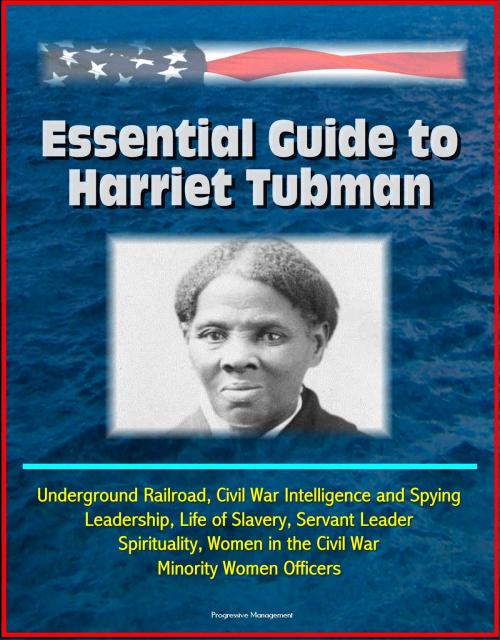Essential Guide to Harriet Tubman: Underground Railroad, Civil War Intelligence and Spying, Leadership, Life of Slavery, Servant Leader, Spirituality, Women in the Civil War, Minority Women Officers
Nonfiction, History, Americas, United States, Civil War Period (1850-1877), Social & Cultural Studies, Social Science| Author: | Progressive Management | ISBN: | 9781311157119 |
| Publisher: | Progressive Management | Publication: | April 22, 2016 |
| Imprint: | Smashwords Edition | Language: | English |
| Author: | Progressive Management |
| ISBN: | 9781311157119 |
| Publisher: | Progressive Management |
| Publication: | April 22, 2016 |
| Imprint: | Smashwords Edition |
| Language: | English |
Professionally converted for accurate flowing-text e-book format reproduction, this unique book reproduces a number of important government reports and studies dealing with the incredible life of Harriet Tubman, whose life was dedicated to fighting for liberty. She will be honored as the portrait on the $20 bill, replacing Andrew Jackson. Harriet Tubman was born into slavery. After she escaped, she became a conductor on the Underground Railroad, helping slaves escape to freedom. During the Civil War, she was active in the Union cause, serving as a nurse, a cook, and a scout, gathering intelligence. Looking back on her life, Harriet Tubman said, “I would fight for liberty so long as my strength lasted.” After the war, she supported the cause of women’s suffrage and was active in suffragist organizations. She died in 1913 and was buried with military honors.
Documents in the collection include: Harriet Tubman: A "Servant" Leader? * Valuable Sources - The Civil War: Black American Contributions to Union Intelligence * Women of Valor in the American Civil War * Minority Women Officers in the Navy: Past, Present, and Future Prospects * Spies and Spying in the Civil War: The Amazing Stories of Elizabeth Van Lew, Harriet Tubman, Thaddeus Lowe, Saving Mr. Lincoln, Intelligence Collection in the North and South, New Tools, Overseas * Harriet Tubman Underground Railroad National Monument * Treasury Department Announcement of New $20 Note
Harriet Tubman's dedication to serve first, then lead, enabled her to become one of the greatest leaders in United States history. Although not formally educated, Harriet Tubman was very intelligent.
Harriet Tubman was an iconic figure in U.S. history who offers an example of heroism that typified the essence of service before self. She was a woman who went from a life of slavery and the trauma that was associated with such a deplorable state to being referred to as "General" by some of the most distinguished members of the Union Officer ranks. Her documented impact on the Civil War, during a time when blacks were viewed as less than capable by the North and the South, is nothing less than remarkable. From an early age, Harriet, whose birth name was Araminta, knew that freedom or dying trying to achieve it were the only options if a civilized life was to come to fruition. Harriet utilized the navigation knowledge she learned from her father to carry out multiple undetected escapee missions from the South to the free North. Her tactics for maintaining motivation were to the novice less than nurturing; her end results were always successful. This paper examines Harriet Tubman from the perspective of servant-leader. Harriet's background; her life of slavery; her spirituality; her intellectual ability; her escape to freedom; her time with Underground Railroad; her impact during and after the Civil War. Each aspect reinforcing the conclusion that Harriet lived and died as a servant-leader.
Harriet Tubman epitomized the characteristics of a servant-leader. She was the type of leader who risked her personal safety with the goal of freeing slaves and abolishing slavery in the South. The great heroine never spoke of defeat, nor did she project a sense of defeat to her followers. She was "Moses," and her followers trusted that she would lead them to the "Promise Land." There is no question that Harriet Tubman was a servant-leader. This paper suggests that she gave her all to others but in return received less than adequate recognition from her country.
Professionally converted for accurate flowing-text e-book format reproduction, this unique book reproduces a number of important government reports and studies dealing with the incredible life of Harriet Tubman, whose life was dedicated to fighting for liberty. She will be honored as the portrait on the $20 bill, replacing Andrew Jackson. Harriet Tubman was born into slavery. After she escaped, she became a conductor on the Underground Railroad, helping slaves escape to freedom. During the Civil War, she was active in the Union cause, serving as a nurse, a cook, and a scout, gathering intelligence. Looking back on her life, Harriet Tubman said, “I would fight for liberty so long as my strength lasted.” After the war, she supported the cause of women’s suffrage and was active in suffragist organizations. She died in 1913 and was buried with military honors.
Documents in the collection include: Harriet Tubman: A "Servant" Leader? * Valuable Sources - The Civil War: Black American Contributions to Union Intelligence * Women of Valor in the American Civil War * Minority Women Officers in the Navy: Past, Present, and Future Prospects * Spies and Spying in the Civil War: The Amazing Stories of Elizabeth Van Lew, Harriet Tubman, Thaddeus Lowe, Saving Mr. Lincoln, Intelligence Collection in the North and South, New Tools, Overseas * Harriet Tubman Underground Railroad National Monument * Treasury Department Announcement of New $20 Note
Harriet Tubman's dedication to serve first, then lead, enabled her to become one of the greatest leaders in United States history. Although not formally educated, Harriet Tubman was very intelligent.
Harriet Tubman was an iconic figure in U.S. history who offers an example of heroism that typified the essence of service before self. She was a woman who went from a life of slavery and the trauma that was associated with such a deplorable state to being referred to as "General" by some of the most distinguished members of the Union Officer ranks. Her documented impact on the Civil War, during a time when blacks were viewed as less than capable by the North and the South, is nothing less than remarkable. From an early age, Harriet, whose birth name was Araminta, knew that freedom or dying trying to achieve it were the only options if a civilized life was to come to fruition. Harriet utilized the navigation knowledge she learned from her father to carry out multiple undetected escapee missions from the South to the free North. Her tactics for maintaining motivation were to the novice less than nurturing; her end results were always successful. This paper examines Harriet Tubman from the perspective of servant-leader. Harriet's background; her life of slavery; her spirituality; her intellectual ability; her escape to freedom; her time with Underground Railroad; her impact during and after the Civil War. Each aspect reinforcing the conclusion that Harriet lived and died as a servant-leader.
Harriet Tubman epitomized the characteristics of a servant-leader. She was the type of leader who risked her personal safety with the goal of freeing slaves and abolishing slavery in the South. The great heroine never spoke of defeat, nor did she project a sense of defeat to her followers. She was "Moses," and her followers trusted that she would lead them to the "Promise Land." There is no question that Harriet Tubman was a servant-leader. This paper suggests that she gave her all to others but in return received less than adequate recognition from her country.















